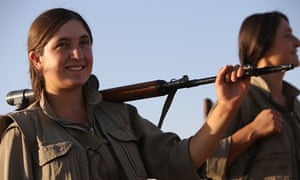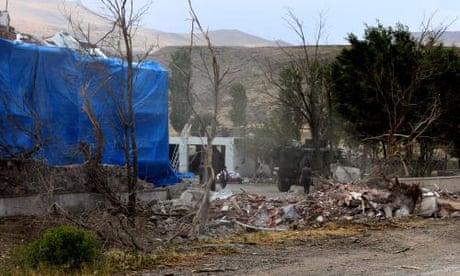 Erdogan launches missile attacks as conflict with PKK explodes after two years of calm
Erdogan launches missile attacks as conflict with PKK explodes after two years of calm
A group of women have gathered in the mountain pastures, a large herd of goats swarming around them. Some stir large pots of milk to make yoghurt, others prepare tea. As a missile is launched from a Turkish military outpost in the distance, they do not even look up at the sound.
“All we want, all we hope and pray for, is peace,” says Gülsen, 45. “As a woman, the war affects me very much,” she said. “I am afraid to go outside, because something might happen. If one of my children is only 30 minutes late, I am worried sick about them. We are desperate to have peace.”
Another woman nods angrily. “Didn’t [Turkish president Recep Tayyip] Erdogan promise that no mother in this country would ever have to cry again? And now look at what he is doing! Waging war!”
After two years of relative calm, the sounds of war have returned to the easternmost part of Turkey, where Kurds have lived on the frontline of a bloody conflict between the Turkish state and the outlawed Kurdistan Workers’ party (PKK) for decades. More than 40,000 are said to have died in the conflict and, local activists say, women often have to bear the brunt of the violence.
“It is very difficult to be a woman in this part of the world,” said one female Kurdish rights activist who wished to remain anonymous. “The situation becomes worse in a war. It is always their sons, their husbands, their brothers who die.”
This new round of hostilities started after a suicide bomber killed 33 Kurdish and Turkish activists in the border town of Suruç last month.
While the Turkish government blamed the attack on Islamic State (Isis) militants, many Kurds in the region point their fingers at Ankara, arguing that the Erdogan government has long supported Isis against growing Kurdish autonomy in northern Syria. Following the bombing in Suruç, Kurdish militants killed two policemen in retaliation. By the end of July, Turkish fighter jets were attacking Kurdish positions in northern Iraq, while the PKK has attacked military outposts and police almost daily, leaving dozens dead. Peace seems an increasingly distant possibility.
Advertisement
Some of the younger girls in the region express growing impatience with the seemingly never-ending confrontation and constant discrimination by the Turkish state.
“We are very tired of this,” says Rojda, 16. “I know how worn down people are. My mother cries a lot.” Two of her brothers joined the PKK only last year, motivated by the group’s successful fight against Isis. She remains silent for a moment. “Sometimes I almost wish that there was this civil war that people now talk about, that we would have this all-out uprising. I am so tired of always having to be scared and waiting. I am tired of being put upon only because I am Kurdish.”
Rojda says she has often wanted to join the rebel movement herself, but finally decided against it. “I am the only daughter in the family. My mother would not be able to cope,” she explains.
She had to leave school early to work on the pastures, but says she is informed about politics and the Kurdish struggle, about women’s rights. “When I am older, I want to be a politician. I want to stand up for us Kurds.”
When three PKK fighters, two of them women, drive up to the pastures, her face lights up. “I know that girls my age in western Turkey admire actors and singers. The girls here admire the guerrilla fighters instead. With them around I feel safe. I feel protected.” She adds: “Especially for the women and girls here, the guerrillas mean a lot. We cannot go to the police or the army if anything happens to us. They don’t help us. But the guerrillas will.”
Female PKK fighters have been a common sight for well over two decades, and some of the militant movement’s founders were women. Analysts estimated that in the 1990s more than 30% of the PKK’s armed fighters were female, and in Hakkari province residents say many women have joined the rebels to assist in the struggle against Isis in Syria and Iraq.

Turkish troops killed in Kurdish militant 'suicide attack'
Read more
“From an historical perspective, women have long been an intricate part of revolutionary movements,” says Daniella Kuzmanovic, associate professor for modern Turkey studies at the University of Copenhagen. “Women’s liberation has been an intricate part of the PKK’s fight, and radical leftist movements everywhere have hailed women for a long time.”
The three PKK members, dressed in khaki uniforms with AK-type rifles slung over their shoulders, receive a joyful welcome. The women hug, while the male fighter only shakes women’s hands. Militants are banned from engaging in sexual relations, marriage or having children, a policy that partly intends to reassure parents of young women joining a radical leftist movement in a deeply conservative region.
Advertisement
Dilan, a PKK commander in her late 30s, catches up with the women standing around. Some of them ask after their children and siblings who have joined the militant group. On her uniform gleams a pin depicting “Comrade Zilan”, or Zeynep Kinaci, a young PKK militant who staged a suicide bomb attack in 1996, killing eight Turkish soldiers. Dilan has been with the group for well over a decade, and joined the PKK after her brother was killed by Turkish security forces.
Pointing at her weapon, Dilan says she does not favour war, but she is ready to fight for her rights: “I don’t like carrying or using a weapon, but do you think as a woman in the Middle East I could survive without one, under these circumstances? It’s a need, not something I relish,” she says. “Women are often seen and depicted as weak and defenceless,” Dilan says, “but every woman has the potential to be strong and free.” She smiles. “It’s a very difficult and long struggle. We have to take it step by step.”
Dilan expresses surprise and dismay that Western media have only recently discovered Kurdish women fighters, and only in the context of their fight against Islamic State militants. “Isis is certainly a terrible group, and their ideology is dangerous especially for women. But our fight is about much more than that.”
Asked about the appearance of female fighters of the Women’s Protection Units (YPJ), the female fighter’s brigades in Syria, in glossy fashion magazines, she rolls her eyes.
“Isn’t it odd that a capitalist consumerist magazine that objectifies women appropriates us in this way? It’s ridiculous.”
Daniella Kuzmanovic points to a narrow-minded, Western-centric perspective that romanticises Kurdish female fighters by obscuring many aspects of their struggle and history.
“These images are a certain form of orientalism,” she explains. “They are perceived as something completely unexpected in a Middle Eastern context. They perpetuate the image of the Middle Eastern woman as hidden away, clothed and passive, and not as an agent in her own right.”
Some of the women who have joined the PKK were fleeing poverty, discrimination or violence. Hejîn, a young woman who left home over four years ago, comes from a poor family in a neighbouring province where she was herding sheep instead of going to school. She jokes about her broken Turkish, but says she learned to read and write in the mountain camps of the PKK.
“I learned about many things there,” she recalls. “For the first time I experienced an egalitarian lifestyle. Back at home I never dared to speak up with anyone, especially not with men.
“In our organisation, we share all the tasks equally. It is considered deeply shameful to wash another man’s socks, for example, and we all cook together.”
Roni, a tall man in his mid-20s, laughs when asked if it was difficult for him to leave behind the comforts of his family home, where he never had to do any housework.
“It’s very simple – if there is a task to be done and I don’t do it, be it washing or cooking or cleaning up, it simply will not get done.”
But the PKK does not only try to rally local males to assist the women in their households with daily chores. Hejîn explains that they also try to intervene in the case of domestic violence, or if a woman feels mistreated by male family members in any way, something that local women say they are very grateful for. The movement also enforces a rigid quota system for all senior ranks in the movement which are co-chaired by a man and a woman, a system that was also introduced in the Peoples’ Democratic party, or HDP, the leftist, pro-Kurdish party that gathered 13 percent of all votes in Turkey’s national elections last June, giving the country the highest ever number of female MPs in parliament, most of them Kurds.
“Things are changing slowly,” says Hawa, 40, a mother of two. “But they are changing. The men respect the guerrillas and we gain more confidence from their example.” She adds that things have slightly improved for women in the local villages and towns, but that there was still much to gain. “And, hopefully, we will be able to shed the guns too.”
All names, except official and historical ones, have been changed.
http://www.theguardian.com/world/2015/aug/16/women-join-kurdish-rebel-ranks?CMP=share_btn_tw

Δεν υπάρχουν σχόλια:
Δημοσίευση σχολίου